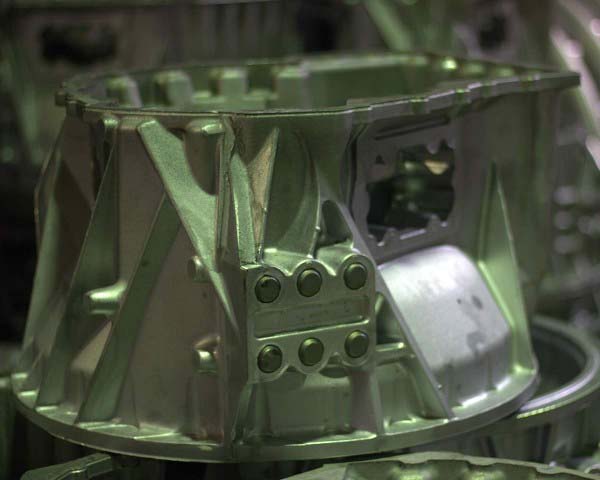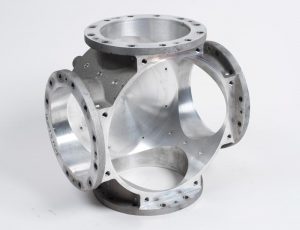Checking Out the Cutting-edge Procedures Behind Modern Aluminum Factory Operations
Modern aluminum factory procedures are undergoing considerable makeover. Automation and AI are improving production techniques, improving both efficiency and precision. The assimilation of 3D printing is simplifying mold development, while sustainability techniques are ending up being much more necessary. Each of these improvements plays a vital duty in redefining the industry. However, the effects of these adjustments prolong beyond plain production performance. What difficulties and possibilities lie in advance for aluminum foundries in this advancing landscape?
The Role of Automation in Light Weight Aluminum Foundries

Automation adds to enhanced safety criteria within the factory setting. By transferring dangerous tasks to devices, human workers can concentrate on supervisory functions and quality assurance, decreasing the danger of crashes. On top of that, information analytics derived from automated procedures give important insights into functional efficiency, causing much better decision-making and continual improvement. As the need for aluminum items grows, the fostering of automation technologies will likely increase, even more transforming the landscape of aluminum shop operations.
Advancements in Spreading Technologies
Recent improvements in casting modern technologies are transforming aluminum foundry procedures. Innovations such as 3D printing assimilation, progressed alloy formulas, and automated process optimization are improving performance and product top quality. These developments are critical in fulfilling the developing needs of the sector.
3D Printing Assimilation
Incorporating 3D printing modern technology into light weight aluminum shop operations has actually transformed typical spreading techniques, improving both performance and accuracy. This innovative method permits the rapid production of complex molds and cores, greatly decreasing preparations and material waste. By utilizing additive manufacturing, foundries can produce complex geometries that were impossible or previously challenging to attain with traditional methods. The versatility of 3D printing likewise makes it possible for fast style adjustments, fostering an extra agile production procedure. In addition, this integration supports the usage of lightweight frameworks, which is significantly important in sectors such as automobile and aerospace. As light weight aluminum foundries remain to adopt 3D printing, they place themselves at the center of technological advancement, driving renovations in item high quality and functional capacities.
Advanced Alloy Formulations
The advancement of sophisticated alloy formulas has actually substantially enhanced spreading technologies in light weight aluminum shop operations. These solutions incorporate numerous aspects, such as silicon, magnesium, and copper, to boost mechanical residential properties and thermal resistance. By tailoring the make-up of aluminum alloys, producers can accomplish details efficiency attributes that satisfy the needs of diverse applications, from auto parts to aerospace frameworks. Making use of innovative alloys also contributes to reduced weight and raised strength, which are crucial consider contemporary design. Furthermore, developments in alloy advancement enable better fluidity throughout spreading, causing enhanced surface area finishes and minimized problems. On the whole, advanced alloy formulas stand for a considerable jump ahead, positioning light weight aluminum factories to fulfill the developing needs of various sectors efficiently.
Automated Refine Optimization
Developments in casting innovations have paved the method for computerized process enhancement in aluminum factory operations. By incorporating advanced software and real-time information analytics, foundries can currently simplify production processes and improve quality assurance. Automated systems keep an eye on variables such as stress, temperature level, and air conditioning rates, permitting for prompt modifications that lessen flaws and waste. Furthermore, equipment knowing algorithms evaluate historic efficiency data to forecast ideal setups, thus increasing effectiveness and decreasing cycle times. Robotics likewise play a substantial function, dealing with recurring jobs that improve safety and precision. In general, these innovations not only drive functional effectiveness however also enable shops to satisfy the growing need for high-grade aluminum parts in various industries.
Smart Manufacturing and Market 4.0 Assimilation
The assimilation of Smart Production and Industry 4.0 within light weight aluminum factories is transforming operational efficiency. By leveraging IoT technologies, automation, and robotics, shops can enhance manufacturing processes and decrease downtime. Furthermore, information analytics provides critical understandings that boost decision-making and drive continual enhancement.
IoT in Foundry Procedures
As makers increasingly welcome the Net of Points (IoT), foundry procedures are experiencing a transformative change towards smart production and Industry 4.0 integration. Precision aluminum casting. IoT innovations enable real-time information collection and evaluation, enhancing decision-making procedures and functional performance. Sensing units and connected devices keep an eye on tools efficiency, material usage, and environmental problems, enabling for aggressive upkeep and resource optimization. This connectivity fosters an extra dexterous production environment, where adjustments can be made quickly in feedback to market needs. Additionally, IoT assists in enhanced traceability and high quality control, as information from the whole manufacturing cycle can be conveniently accessed and evaluated. Generally, the integration of IoT in shop operations substantially boosts performance and drives advancement in light weight aluminum manufacturing processes
Automation and Robotics Assimilation
Automation and robotics assimilation is changing aluminum shop procedures by boosting efficiency and precision. This transformative strategy streamlines processes such as molding, pouring, and completing, minimizing human error and raising result uniformity. By utilizing advanced robot systems, shops can accomplish greater manufacturing prices while keeping stringent quality requirements. Automated systems additionally make it possible for real-time monitoring and flexible control, enabling for swift modifications to manufacturing parameters. Furthermore, the assimilation of robotics lessens labor prices and mitigates safety and security threats connected with hands-on handling of liquified steel. As factories accept smart manufacturing concepts integral in Market 4.0, the harmony between automation and robotics solidifies their affordable side, leading the way for sustainable growth and innovation in the aluminum spreading industry.
Information Analytics for Effectiveness
Harnessing information analytics significantly enhances effectiveness within aluminum shop procedures, straightening with wise manufacturing and Industry 4.0 principles. By leveraging real-time data collection and evaluation, foundries can keep an eye on production procedures, anticipate equipment failings, and optimize resource allocation. This data-driven approach facilitates insightful decision-making, enabling supervisors to identify traffic jams and improve workflow. Additionally, anticipating analytics encourages foundries to anticipate market demands, therefore decreasing waste and making sure timely product delivery. Integration of information analytics with IoT devices enhances operational visibility, promoting a positive maintenance society. Ultimately, executing these innovative logical strategies not only increases performance but likewise drives innovation, positioning aluminum factories to meet the progressing demands of the industry while preserving one-upmanships in a swiftly altering landscape.
Sustainable Practices in Light Weight Aluminum Casting
While the aluminum casting industry has actually commonly encountered ecological difficulties, numerous factories are currently embracing lasting methods to minimize their effect (Precision aluminum casting). A considerable focus has been on recycling aluminum scrap, which not only decreases waste but additionally preserves energy compared to main light weight aluminum production. Cutting-edge melting modern technologies, such as induction heaters, improve energy effectiveness and lower greenhouse gas discharges
Additionally, shops are carrying out closed-loop water supply to lessen water consumption and reduce thermal air pollution. Making use of eco-friendly binders in mold-making processes is obtaining traction, additional decreasing hazardous emissions.
In addition, some centers are spending in renewable resource resources to power operations, lining up with international sustainability objectives. By integrating these practices, the light weight aluminum spreading industry is progressing toward a much more environmentally accountable future, showing that economic development can coexist with environmental stewardship - aluminum casting. These initiatives mirror a dedication to sustainability and the relevance of ecological liability in manufacturing
Quality Control Innovations
As the light weight aluminum spreading industry advances in the direction of sustainability, the value of top quality control technologies becomes increasingly noticeable. Modern aluminum factories are taking on sophisticated technologies to enhance their quality control procedures. Techniques such as real-time surveillance and data analytics allow producers click here for info to spot issues and variances early in the manufacturing cycle. Implementing computerized inspection systems equipped with maker discovering formulas assurances that items fulfill rigorous top quality requirements while lessening human mistake.
The combination of non-destructive testing methods, such as radiographic and ultrasonic examinations, provides deeper understandings right into the integrity of spreadings without harming the product. These advancements not just boost product reliability however likewise decrease waste, aligning with sustainability goals. In addition, the fostering of standard top quality frameworks aids streamline operations throughout different factories, guaranteeing uniformity in output. Jointly, these developments are improving high quality control, promoting a culture of excellence within the aluminum spreading field.
Future Fads in Aluminum Shop Operations
What innovations exist in advance for aluminum shop procedures? The future of light weight aluminum factories is positioned aluminum casting for improvement through innovations in automation, synthetic knowledge, and lasting practices. The assimilation of robotics and automated systems is expected to enhance performance and precision in the spreading processes, reducing human mistake and labor prices. Additionally, AI-driven analytics will make it possible for real-time surveillance and predictive maintenance, maximizing functional efficiency and lessening downtime.
Sustainability continues to be a prime focus, with factories increasingly adopting eco-friendly practices, such as making use of recycled light weight aluminum and developing low-emission melting technologies. Advancements in 3D printing are also anticipated to transform mold-making, permitting intricate geometries and minimized product waste. As the industry welcomes digitalization, data-driven decision-making will certainly come to be crucial, making it possible for factories to react promptly to market needs. Collectively, these patterns promise to redefine aluminum foundry operations, making them a lot more effective, sustainable, and adaptable to future obstacles.

Frequently Asked Concerns
What Precaution Are Executed in Aluminum Shop Procedures?
Light weight aluminum factory procedures execute different precaution, including personal safety devices, air flow systems to manage fumes, routine safety training, emergency response plans, and stringent monitoring of temperature level and equipment to avoid mishaps and warranty worker security.
Exactly How Do Factories Manage Labor Force Educating for New Technologies?

What Products Are Frequently Reused in Light Weight Aluminum Foundries?
Light weight aluminum shops commonly recycle scrap aluminum, consisting of post-consumer items like drink containers, auto components, and building and construction products. This recycling process lowers waste and saves sources, contributing to a more lasting aluminum manufacturing market.
Just How Does Aluminum Casting Influence the Setting?
Aluminum casting impacts the environment through energy-intensive procedures, greenhouse gas discharges, and possible regional contamination. Developments in reusing and sustainable methods can alleviate these impacts, advertising a much more environmentally friendly strategy to light weight aluminum production.
What Are the Normal Lead Times for Aluminum Spreading Projects?
Typical lead times for light weight aluminum casting jobs vary substantially, typically ranging from 2 to six weeks. Variables influencing these timelines include intricacy, order dimension, and material accessibility, influencing general production routines in foundry operations.
Automation progressively plays an essential duty in aluminum shops, enhancing performance and precision in the production process. Improvements in casting technologies have led the means for computerized procedure improvement in light weight aluminum foundry operations. Harnessing data analytics greatly boosts efficiency within aluminum shop operations, aligning with clever manufacturing and Market 4.0 principles. A significant emphasis has actually been on recycling light weight aluminum scrap, which not just reduces waste however likewise preserves power compared to primary light weight Visit Your URL aluminum production. Aluminum foundries generally recycle scrap light weight aluminum, consisting of post-consumer items like drink canisters, automotive parts, and building products.